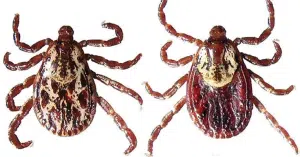Protecting Your Pet from Ticks in North Carolina
Understanding the Tick Threat
Ticks are parasitic arachnids that feed on blood and can transmit dangerous bacteria.
- All stages of life can be dangerous. They can hide in tall grass, shrubs, and leaf litter.
- Common culprits in NC: The American Dog Tick (carriers of Rocky Mountain Spotted Fever), Lone Star Tick (linked to ehrlichiosis and the alpha-gal allergy), Brown Dog Tick (known to infest homes), and Black-legged Tick (carriers of Lyme disease) are all found in our area.
- Year-round vigilance: Ticks can be active any time the temperature is above freezing, so year-round prevention is essential.
What to Do If You Find a Tick (Common Ticks of NC: An Identification Guide)
- Don’t Panic: Stay calm to keep your pet calm.
- Use Tweezers: With fine-tipped tweezers, grab the tick firmly by the head, right where it enters the skin.
- Pull Straight Out: Pull the tick out with a slow, steady motion. Twisting can cause the mouthparts to break off.
- Clean the Spot: Disinfect the bite area and your hands.
- Save the Tick: Put the tick in a sealed container with a date. Your vet can identify it and help guide your pet’s care if they develop symptoms.
- Avoid Dangerous Tricks:Never use folk remedies like applying heat or petroleum jelly, as these can stress the tick and cause it to regurgitate into the wound.
The Best Defense Is a Good Offense

Love and Kisses Pet Sitting provides Daily Dog Walking and Vacation Pet Sitting for domestic, exotic and farm animals in the following areas of Charlotte: The Arboretum, Ballantyne, Brandon Oaks neighborhood, Concord, Harrisburg, Hemby Bridge, Highland Creek neighborhood, Northeast/Southeast Charlotte, NC, Indian Land, Kannapolis, Lake Park, Marvin, Matthews, Mint Hill, Monroe, Providence Estates East neighborhood, Providence Plantation neighborhood, Provincetowne neighborhood, Skybrook neighborhood, Stallings, Waxhaw, Weddington, and Wesley Chapel. Our service area covers parts of Cabarrus, Mecklenburg and Union counties!

















